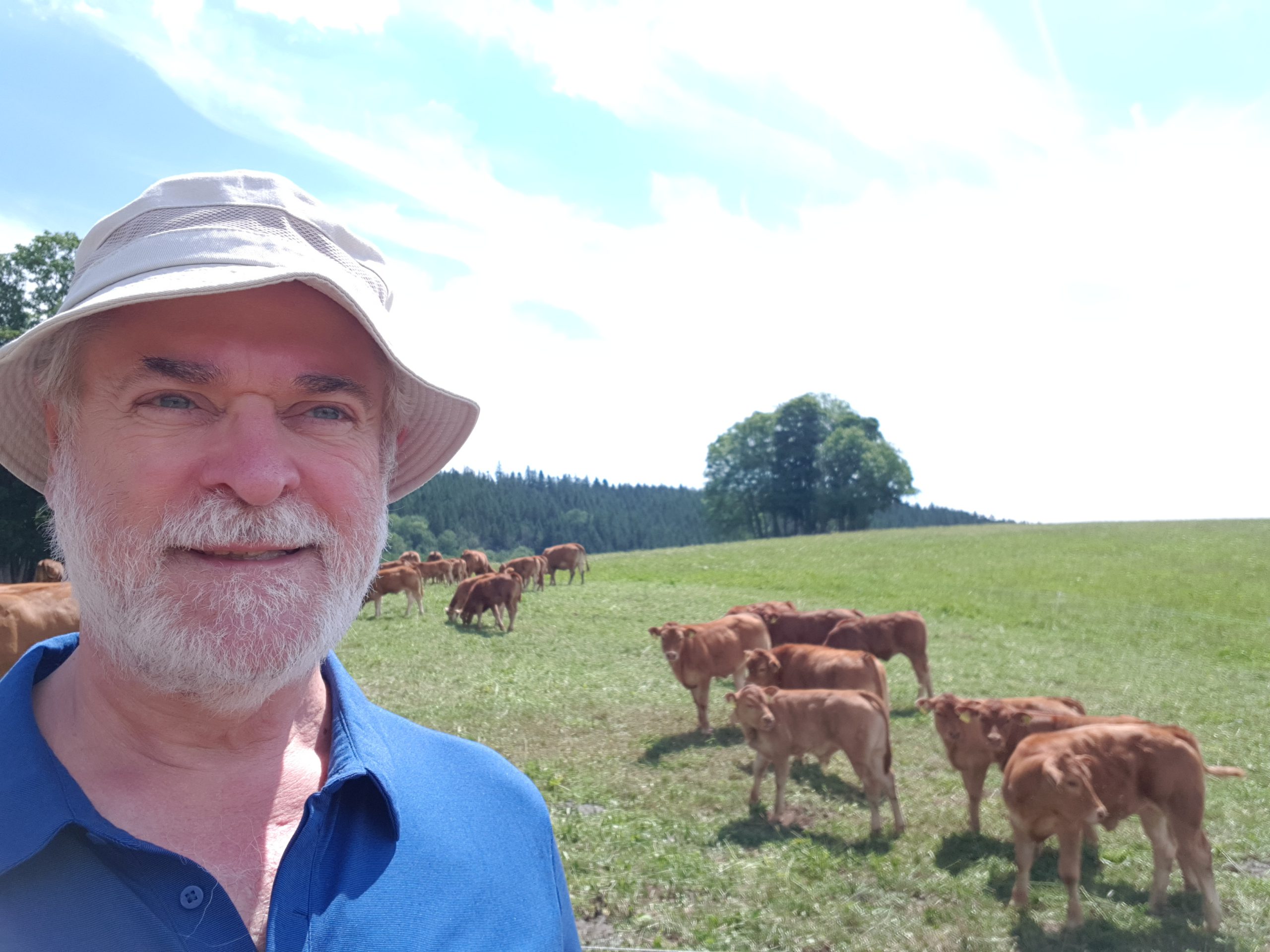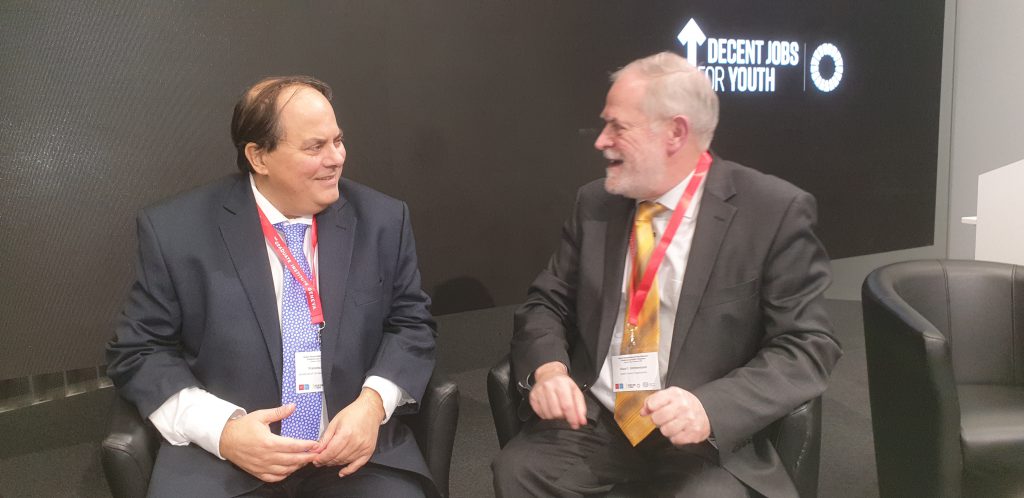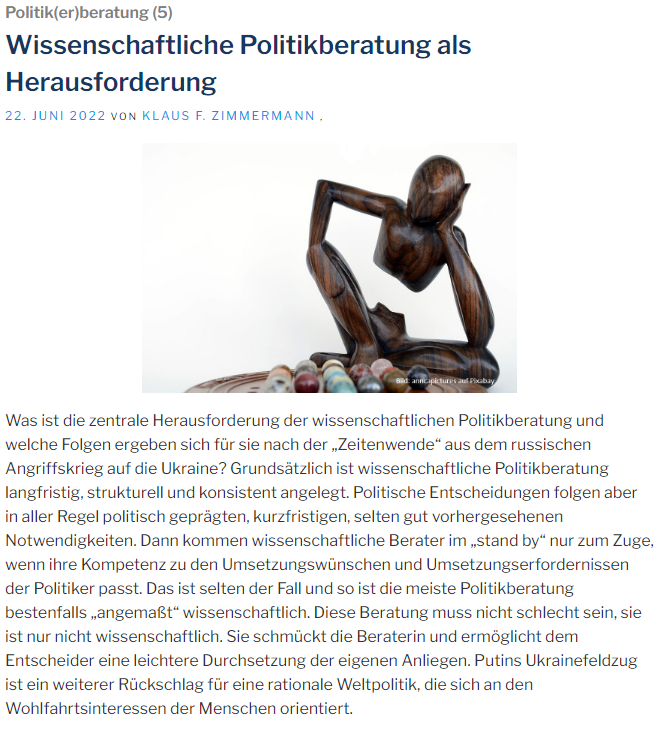Touring the Black Forest: Feldberg & Titisee





Ends;
Published today, 18 July 2022.
Vu M. Ngo, Klaus F. Zimmermann, Phuc V. Nguyen, Toan Luu Duc Huynh and Huan H. Nguyen (2022). “How education and GDP drive the COVID-19 vaccination campaign”, UNU-MERIT Working Paper #2021-046. CEPR Discussion Paper No. 16757; GLO Discussion Paper No. 986. Prepublication. OPEN ACCESS:
Archives of Public Health 89 (171) 2022.
DOI 10.1186/s13690-022-00924-0.
Further Covid-19 related research includes:
Ends;
It is with great sadness that we have to accept the much too early death of Professor Francesco Pastore (*June 6, 1966; +July 13, 2022) of Università della Campania Luigi Vanvitelli.
He has been an excellent economist, a great servant of the scientific community, an ambitious and supportive researcher, a wonderful human being, and a real friend.
Francesco, you will be badly missed!
Among his many activities, Francesco Pastore has been
His work has been well published and is broadly cited. We have admired his endless engagement and his committed professional activities. He has made a long-lasting impact on our profession.


Ends;
During the EBES 40 Conference (6-8 July 2022) in Istanbul and hybrid, an Editor’s Panel Session on July 6 discussed publication issues in research journals. 4 Editors-in-Chief exchanged views and answered questions from the local and worldwide audience moderated by EBES & GLO President Klaus F. Zimmermann.

Clockwise from above:
Ends;
Vu M. Ngo, Klaus F. Zimmermann, Phuc V. Nguyen, Toan Luu Duc Huynh and Huan H. Nguyen (2021). “How education and GDP drive the COVID-19 vaccination campaign”, UNU-MERIT Working Paper #2021-046. CEPR Discussion Paper No. 16757; GLO Discussion Paper No. 986. Forthcoming 2022 OPEN ACCESS: Archives of Public Health. Prepublication.
Contributions to the Covid-19 debate receive broad attention. The Zimmermann et al. (2020) paper (see below) got #TopDownloadedArticle status in the journal The World Economy.
Further Covid-19 related research include:
Ends;
This confirms the strong upward trend in performance of the Journal of Population Economics already documented by the Scopus Cite Score, see LINK. While the Scopus Cite Score measures the contributions of journals with a broader coverage and a more long-term (4 years) basis, the Clarivate Journal Impact Factor 2021 is calculated as citations in 2021 to items published in 2019 and 2020 divided by the number of citable items in 2019 and 2020.

Ends;
Was sind die strukturellen Herausforderungen der Beratungsverflechtung von Wissenschaft und Politik? Welche Aufgaben ergeben sich aus der “Zeitenwende” des Ukarinekrieges? Diesen Fragen geht Klaus F. Zimmermann (Universität Bonn, Freie Universität Berlin & Global Labor Organization, GLO) in einem Beitrag für die Wirtschaftliche Freiheit. Das ordnungspolitische Journal am 22. Juni 2022 nach (volle Fassung mit freiem Zugang: LINK, Prepublication hier). Weitere Quellenhinweise finden sich am Ende dieses Posts hier unten.

Diskussionsbeiträge zur Politikberatung:
Ends;
THE INTERNATIONAL ECONOMY, The magazine of international economic policy, SPRING 2022 issue
“Global analysts say that the United States and China are in a race to achieve the most advanced technological breakthroughs. The winner will likely dominate the global economy through the end of the century. Sometimes India and Japan are mentioned as third players in this fierce global competition. But the European Union is barely mentioned, if at all……”
The Biggest Loser
Is the European Union on course to become the big loser in the global tech race?
A symposium of views COPY
Featuring commentary by Marco Annunziata, Marjory S. Blumenthal, Marek Dabrowski, James E. Glassman, Joseph V. Kennedy, Michael Lind, Thomas Mirow, Holger Schmieding, Gunther Schnabl, Stan Veuger, and Klaus F. Zimmermann.
Klaus F. Zimmermann
“Europe can no longer stay on the sidelines of U.S.-Chinese hostility to enjoy trade benefits with China. Europe will lose or win together with the United States.
Europe is considered to be lagging behind in the global tech race, in particular while striving for an edge in artificial intelligence innovations. While an invention needs a challenge, innovation requires a large responsive market and risk-open societies. A common observation is that Europe, and Germany in particular, has great inventive capital but less prowess in establishing marketable products than the United States. The recent successful cooperation of Pfizer and BioNTech in the Covid-19 pandemic has shown some elements of this divide. Hence, the established view is that the United States leads in research and development, while Europe relies on talent. A further European deficit is the large dependence on foreign-owned technology providers for artificial intelligence, cloud computing, and 5G technologies.
Under Presidents Obama and Trump, the United States has turned from Europe to Asia to focus on the race with China for the most advanced technological breakthroughs. China has won some legs of this race already. It has announced its challenge to the primacy of the United States (to become number one by 2049), in particular on the technology front. It needs this success to satisfy its enormous need for imported natural resources and nutrition to feed the growing wellbeing of its large population, and to satisfy its ambition for global hegemony.
In the face of a squandered alliance of the United States with Europe, the Chinese Belt and Road Initiative has been a powerful strategy to access resources and to develop a global market to sell powerful technological innovations. China’s envisioned success badly depends on technology and trade.
The recent Russian military aggression in Ukraine makes China’s strategic partnership with Russia a doubtful venture, damaging the Belt and Road strategy. A world of bipolar globalization with economic decoupling (Zeitenwende) may arise, confronting democracies with autocratic regimes: pushing for a reformed transatlantic alliance by developing trade and innovations internally in more intense and more open common markets while regulating and restricting trade and technological exchange elsewhere. This would weaken the global rise in wellbeing, but may change the nature of the technology race considerably. China could become the big loser, at least in terms of its huge ambitions.
Since the United States needs Europe in the upcoming global political bipolar divide of the world, this requires a revival of common trade and technology policies. Europe can no longer stay on the sidelines of U.S.-Chinese hostility to enjoy trade benefits with China.
The potential of Europe is creativity and inventive capital derived from diversity and huge markets. Examples include cooperation of the London-based artificial intelligence venture InstaDeep with Germany’s BioNTech to identify and fight dangerous virus variants early on. And the European commitment to accelerating the energy transition implies technological advances. Such a reformed transatlantic alliance makes the question of whether the European Union may be the big loser of the tech race largely irrelevant. Europe will lose or win together with the United States. However, this alliance should seek strong collaborations with Japan, South Korea, and India.”
THE INTERNATIONAL ECONOMY, The magazine of international economic policy, The Bigest Loser. Is the European Union on course to become the big loser in the global tech race? SPRING 2022 issue, pp. 47-48.
Ends;
Unlike impact factors, CiteScore measures the contributions of journals with a broader coverage and more long-term (4 years) basis.
The May 2022 published scores for 2021 are defined as: “CiteScore 2021 counts the citations received in 2018-2021 to articles, reviews, conference papers, book chapters and data papers published in 2018-2021, and divides this by the number of publications published in 2018-2021.”
CiteScore of Scopus for the Journal of Population Economics is now 6.5 in 2021 following 3.9 in 2020.
The CiteScore Rank in 2021: 75/696, Q1 in Economics and Econometrics & 3/124, Q1 in Demography.
The CiteScoreTracker 2022 (June) is already 6.5.
The Journal of Population Economics is in good company:
Ends;
Contributions to the Covid-19 debate receive broad attention. The Zimmermann et al. (2020) paper (see below) gets #TopDownloadedArticle status in the journal The World Economy.
The Covid-19 related research includes:
Ends;